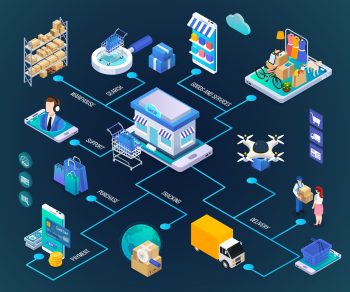
Envision a reality where vital everyday goods fail to reach shelves in stores and supermarkets—a scenario that becomes all too real when the global supply chain and logistics face disruption, as witnessed during the onset of the COVID-19 pandemic in 2020.
The outcome? Consumer shortages and a plethora of shuttered businesses, especially poignant in sectors such as chemicals, pharmaceuticals, and fast-moving consumer goods (FMCG), where the seamless, rapid flow of supplies is paramount.
This is the reason businesses need to be agile and adaptable, so they can adjust to evolving needs and changing distribution dynamics—and, ultimately, keep thriving now and in the years to come.
Logistics Is in Transition
But that adjustment just got harder now due to the shift in distribution patterns across various sectors—including in the industries of chemicals, pharmaceuticals, and fast-moving goods. This shift, in turn, has resulted in these challenges:
- Complex Global Supply Chains. Today’s businesses operate within intricate global supply chains characterised by increasing interdependence among nations, suppliers, retailers, and manufacturers. This complexity offers advantages, like cost efficiencies and access to a broader consumer base, but also challenges in terms of coordination, communication, and risk management.
- Supply Chain Disruptions. Unforeseen events, such as natural disasters, geopolitical tensions, and global health crises, can adversely impact the supply chain, and the ramifications of this include shortages, production delays, and increased logistics costs.
- Statutory Compliance and Industry-Specific Regulations. Each industry is subject to specific laws, standards, and certifications that govern production, transportation, and distribution processes. Organisations in the chemical industry, for instance, must fill out material safety data sheets for all chemicals transported, while pharmaceutical companies have to comply with stringent regulations set by the Food and Drug Administration—or its equivalent agencies—in the countries they operate in. Failure to comply with these regulations can result in legal repercussions, financial penalties, and damage to the brand’s reputation.

The foregoing underscores the pressing for companies to leverage the best available technologies to adapt to these seismic shifts in distribution by:
- Streamlining the supply chain (and logistics).
- Optimising inventory.
- Reducing lead times.
- Enabling compliance monitoring.
- Responding to market changes.
Azentio ONEERP’s Distribution Cloud fits the bill to a T. It is a cloud-based platform that enables companies to competitively manage industry operations, from product life cycle management to B2B and B2C management to automated workflows and logistics.
Even better, it specifically caters to businesses across different verticals, including the chemical, pharmaceutical, and FMCG sectors:
- Chemical. The Azentio Distribution Cloud provides a fully integrated business software solution designed to manage and improve chemical distributors’ complete business operations.
- Pharmaceutical. The Azentio Distribution Cloud helps streamline businesses by adding agility to its operations with competence and expertise specific to the global pharmaceutical trading industry.
- FMCG. The Azentio Distribution Cloud serves as a one-stop solution for the FMCG sector enabling supply chain visibility, complete control over inventory, and more.
In other words, Azentio ONEERP Distribution Cloud lets businesses run operations more efficiently, so their teams can focus on the needs of customers instead of worrying about distribution and inventory. That means reductions in stockouts, improved lead order times, increased on-time fulfilment, and greater customer experience.
It also means a bigger bottom line—and a business that gets things right every time, all the time.
Click HERE to learn more about Azentio ONEERP Distribution Cloud.
 (0)
(0) (0)
(0)Archive
- October 2024(44)
- September 2024(94)
- August 2024(100)
- July 2024(99)
- June 2024(126)
- May 2024(155)
- April 2024(123)
- March 2024(112)
- February 2024(109)
- January 2024(95)
- December 2023(56)
- November 2023(86)
- October 2023(97)
- September 2023(89)
- August 2023(101)
- July 2023(104)
- June 2023(113)
- May 2023(103)
- April 2023(93)
- March 2023(129)
- February 2023(77)
- January 2023(91)
- December 2022(90)
- November 2022(125)
- October 2022(117)
- September 2022(137)
- August 2022(119)
- July 2022(99)
- June 2022(128)
- May 2022(112)
- April 2022(108)
- March 2022(121)
- February 2022(93)
- January 2022(110)
- December 2021(92)
- November 2021(107)
- October 2021(101)
- September 2021(81)
- August 2021(74)
- July 2021(78)
- June 2021(92)
- May 2021(67)
- April 2021(79)
- March 2021(79)
- February 2021(58)
- January 2021(55)
- December 2020(56)
- November 2020(59)
- October 2020(78)
- September 2020(72)
- August 2020(64)
- July 2020(71)
- June 2020(74)
- May 2020(50)
- April 2020(71)
- March 2020(71)
- February 2020(58)
- January 2020(62)
- December 2019(57)
- November 2019(64)
- October 2019(25)
- September 2019(24)
- August 2019(14)
- July 2019(23)
- June 2019(54)
- May 2019(82)
- April 2019(76)
- March 2019(71)
- February 2019(67)
- January 2019(75)
- December 2018(44)
- November 2018(47)
- October 2018(74)
- September 2018(54)
- August 2018(61)
- July 2018(72)
- June 2018(62)
- May 2018(62)
- April 2018(73)
- March 2018(76)
- February 2018(8)
- January 2018(7)
- December 2017(6)
- November 2017(8)
- October 2017(3)
- September 2017(4)
- August 2017(4)
- July 2017(2)
- June 2017(5)
- May 2017(6)
- April 2017(11)
- March 2017(8)
- February 2017(16)
- January 2017(10)
- December 2016(12)
- November 2016(20)
- October 2016(7)
- September 2016(102)
- August 2016(168)
- July 2016(141)
- June 2016(149)
- May 2016(117)
- April 2016(59)
- March 2016(85)
- February 2016(153)
- December 2015(150)

